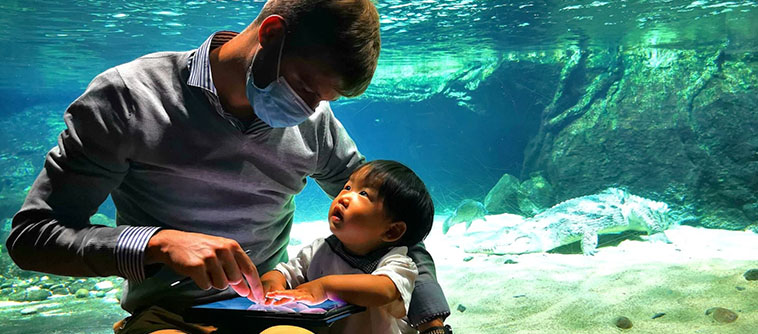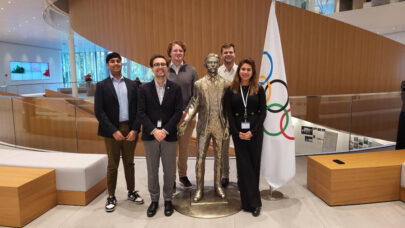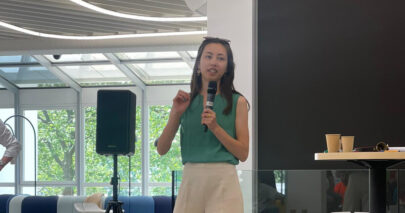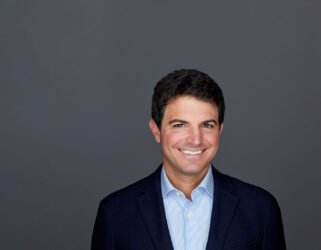
Imagination and creativity came together at the IMD MBA Innovation Week in September as participants developed original prototypes for everything from mobility solutions to technologically advanced “edu-tainment”.
The week-long challenge was one of many in the kick-off to E4S (Enterprise for Society) – an academic collaboration by the University of Lausanne (UNIL), the Institute for Management Development (IMD) and the EPFL (Ecole Polytechnique Fédérale de Lausanne). E4S aims to activate change by strengthening the local start-up and innovation eco-system and train the next generation of leaders by offering a master’s degree in Sustainable Management and Technology beginning in 2121.
“The goal of E4S is to get new groups of people to interact and start thinking in innovative ways,” said Professor Jean-Philippe Bonardi, Dean of HEC (Haute Ecole de Commerce at UNIL) whose students participated for the first time, “and the IMD MBA Innovation Week did exactly that.”
An intense week of collaboration
The challenge in this IMD MBA Innovation Week was to improve the visitor experience at Aquatis, the largest freshwater aquarium in Europe.
While the aquarium-vivarium boasts over 300 different species – including a rare Komodo dragon – it hasn’t seen such impressive visitor numbers. With the COVID-induced shutdown as a new variable to contend with, Aquatis turned to IMD’s MBA Class of 2020 to generate new ideas to drive revenues by improving the experience on offer.
The IMD MBA Innovation Week comprised six full days of programming, including sessions on creating high-performance teams, activating a design mindset, turning ideas into winning models and engaging audiences with storytelling, amongst others. Each team had the opportunity to work closely with coaches and mentors that answered any questions and helped guide the teams to success.
“At the same time as they developed their innovation muscle, participants reflected on their capacity to function effectively as high-performance teams” said IMD Professor Cyril Bouquet, who created and leads the IMD MBA Innovation week. “We wanted this week to be a real innovation and leadership lab.”
The participants spent time at Inartis Foundation’s innovation atelier Université, where they prototyped and tested their concepts to demonstrate the desirability, feasibility and viability of the ideas that emerged, and learned to pitch them to mobilize support and attract investors.
“The participants had access to a wealth of experts to help bring their ideas to life,” said Benoit Dubuis, Director, Inartis Foundation. “This included woodworkers and welders – students from the EPFL Rocket team – to create prototypes, UX specialists from coding school Le Wagon for app design and even actors to help with pitching skills.”
Five areas of focus
The project brief recommended five key target areas for the MBA participants: making the space more welcoming, making it more interactive, engaging visitors through social media, taking advantage of digital technology, and guiding and controlling the flow of traffic.
Many presentations focused on bringing more “edu-tainment” to the experience, with treasure hunts, puzzles and other games designed to boost learning while raising the fun factor.
Bracelets and other merchandise with QR codes were also popular, creating savvy personal souvenirs that double as a marketing tool.
Other common ideas were to tailor the entire experience for children, with integrated playgrounds and interactive exhibits, and to raise sales via the café, restaurant and gift shop. This included providing monthly or seasonal toys for purchase or win, similar to the concept favored by fast food chains.
A winning idea
Eighteen different groups presented their ideas to make the visit to Aquatis one to remember. Of the finalists, three teams were declared winners – one of which earned a special nomination with its proposal for how to better include physically challenged visitors. Team Hexa Blues included UNIL student Huy Nguyen and IMD participants Mina Loots, Emon Goswami, Sejal Singhi, Viktoria Lindbäck and Ruchi Senthil. Their presentation illustrated how inclusive design that improves accessibility for visually impaired, sensory sensitive and wheelchair borne patrons could vastly improve the customer experience for all visitors.
“We challenged the Aquatis team to stop thinking of accessibility as just access ramps, dropped curbs and screen readers,” said Loots, “and start seeing the new opportunities of inclusive design.”
Two winning pitches were lauded for the intriguing stories behind their innovative ideas. Tied for the win were Nick Geldof, Aurore Amaudruz, Haichen Liu, Matteo Conti and Hannah Kohrs from IMD, in addition to Thuan Nyugen from the HEC, and a second team with Dennis Stone, Konstantinos Pierros, Eri Kawana, Natalia Elizondo, Stephanie Hurry and Charlotte Bonardi from HEC.
“We wanted to engage our customers by triggering curiosity,” said Geldof, “so we took the customer journey and built our story with three distinct steps.”
Their pitch was comprised of a three-pronged plan to engage customers, beginning with a story about a message in a bottle that referenced a treasure chest hidden at Aquatis. In order to crack the code to find the treasure, parents and children must work together to solve the clues.
IMD MBA candidate Jameson Goodman said: “All eighteen teams developed diverse and creative proposals for the Aquatis leadership – proposals that promised to engage the five senses, provide tactile or interactive experiences and fully address the ‘now’ of the customer.”
Participants agreed that the IMD MBA Innovation Week was invaluable for the lessons learned not only in technological innovation itself, but the teamwork philosophy behind it.
“I experienced the positive impact that creating upfront alignment and trust can have on the success of a team,” said Stephanie Hurry, MBA participant. “We all committed to respecting each other and to giving our best to the task, and in the end we were successful in winning the innovation challenge!”
The management team at Aquatis agreed:
“These brilliant young minds brought a fresh perspective to our thinking,” said Michel Ansermet, Director of the Aquatis Museeum. “We were presented with ideas that would never have crossed our radar otherwise and now have clarity about which strategic direction we’d like to move in to improve our visitor experience.”


